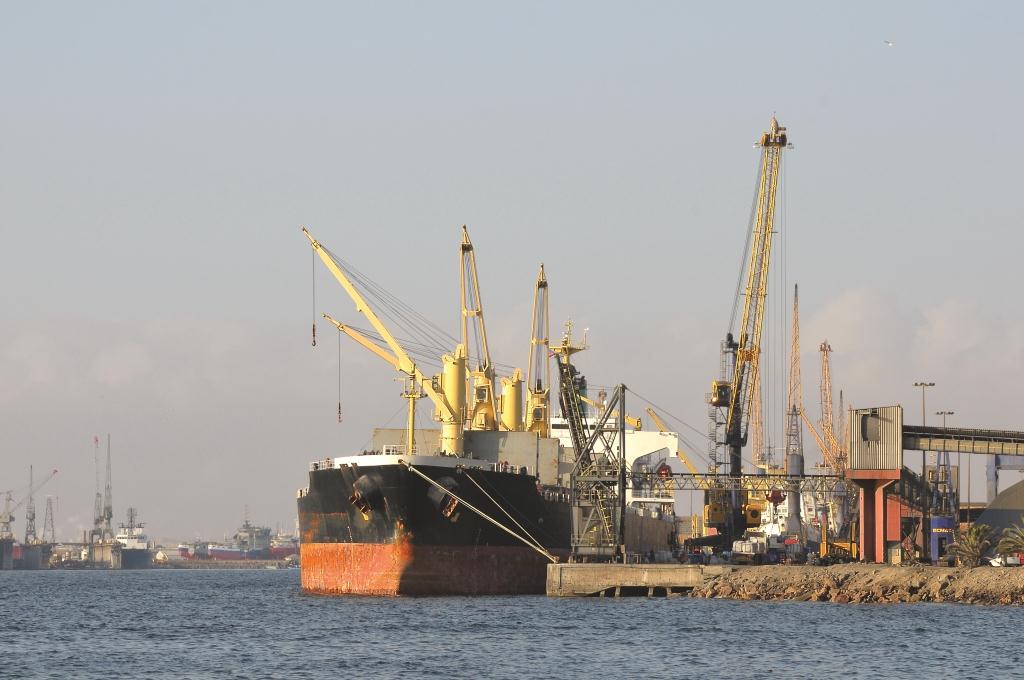It must be one of the smallest airports in the world. It’s about 100 square meters with one entry and one exit. This is the gateway to Walvis Bay, Namibia, a place where the desert meets the ocean.
Its noon, the city is as quiet as the grave. It is the beginning of the year and most executives in the fishing industry are on holiday, far from their workers who risk their lives for a catch. The Walvis Bay dock tells the story of two fishermen and with it, the economy.
On this day, one fisherman is angry and feels cheated. Immanuel Petros, a charismatic union man in his forties, is leading chanting workers with clenched fists. They want more money and better working conditions.
“If you see a shack in Walvis Bay, you know it belongs to a fisherman. Workers doing the hard work earn less than $100 a month, while working for more than 16 hours a day. The city lives and breathes poverty,” says Petros.
The country’s failure to create jobs for the poor was also confirmed in a World Bank report in 2015.

“Namibia’s economic growth, prudent macroeconomic policies, and generous social programs have not generated the jobs needed to overcome the inequitable distributions of income and assets or raise living standards in rural areas and among the urban poor,” says the report.
According to the Central Bureau of Statistics, the unemployment rate in Namibia decreased to 28.10% in 2014 from 29.60% in 2013. Although the economy shows some signs of improvement, Petros and many others feel it’s not enough.
On the other side of the dock, fishing has thrown up an entrepreneur. The Namibian economy gave Rojo van Wyk the chance to catch a better future.
Van Wyk is the director of Mack Fishing. Ten years ago, he was selling a handful of fish but now sells more than 40 truckloads per month.
“Getting into the fishing business was my big chance, 10 years ago I was doing nothing and literally down and out and along the way I got this opportunity and now I own a fishing quarter.”
By owning a fishing quarter, Van Wyk can allocate fishing rights to beginners who pay him a small amount to fish their way out of poverty. For him, more fish is more money on his balance sheet.
According to the World Bank, political stability and sound economic management have helped anchor economic growth and poverty reduction in Namibia, leading to opportunities like the one taken by Van Wyk.
“Low interest rates, fiscal stimulus, and unusually high foreign direct investment (FDI) in mining have resulted in a construction boom, fast household consumption growth, and solid growth in tradable services,” says the bank.
The African Development Bank (AfDB) believes the country can do more in addressing the challenges faced by many of Petros’ peers.
“Namibia must deepen reforms to get better value from agriculture and extend nonmineral diversification to create jobs and reinforce spatial inclusion,” says one of the AfDB’s Economic Outlook reports.
Hanns Spangenberg, an analyst at NKC Independent Economists, says Namibia continues to be rated at an investment grade BBB- with a stable outlook.
“While the country’s fiscal and current account balances have deteriorated in recent years, and this report reflects weaker than before projections over the medium term, there is no reason to panic. The government is able to cover its borrowing needs on the domestic and international capital market while the current account deficit has increased external debt to a similar level recorded by Namibia’s ‘BB+’ and ‘BBB-’ peers,” he says.
“Namibia’s positive long-term prospects for mining exports are one of our key sovereign debt rating strengths. However, the sector has struggled during the last year due to lacklustre external demand for the country’s extractive exports. A decrease in diamond extraction led directly to the sector’s weak growth last year, while uranium output continued to record a contraction.”
He also added that, on a nominal basis, Namibia’s GDP is estimated to have contracted from around $14.6 billion in 2014 to around $13.2 billion in 2015 due to the depreciation of the South African rand (and subsequently the Namibian dollar).

“On real terms, however, economic expansion is estimated at 4.9 percent in 2015, and is projected to accelerate slightly to 5 percent this year. Factors driving real GDP growth include strong wholesale and retail numbers, government activity, and a healthy financial services sector.”
Gary van Staden, a political expert, says there has been renewed impetus to tackle issues surrounding poverty and unemployment.
“The newly elected administration included some new people with vast experience in this field that are sure to make a meaningful impact over the long term,” says Van Staden.
He also added that political stability was crucial to Namibia’s future prospects.
“While one-party systems tend to be relatively unstable, given enough time, there is no indication of that in Namibia at the moment. On the contrary, the stability of the political environment has been a key factor in attracting foreign investment. While this may change over the extreme long term (i.e. in the next 10 to 20 years), this is not considered to be an issue currently.”
